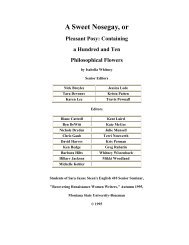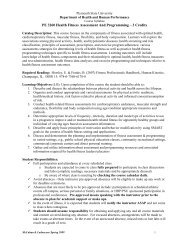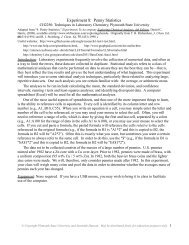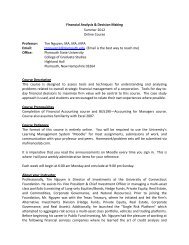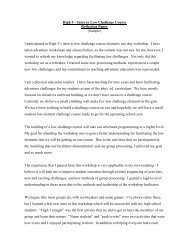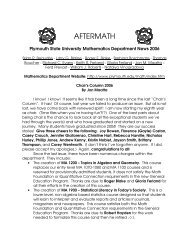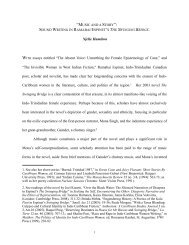2007-2008 Undergraduate Academic Catalog - Plymouth State ...
2007-2008 Undergraduate Academic Catalog - Plymouth State ...
2007-2008 Undergraduate Academic Catalog - Plymouth State ...
- No tags were found...
Create successful ePaper yourself
Turn your PDF publications into a flip-book with our unique Google optimized e-Paper software.
** These Connections are three-credit experiences taken aspart of the major and hence add no credits to those requiredfor the major.Students who entered in 2003–2004 or earlier, but elect to followthe 2005–2006 or subsequent <strong>Catalog</strong> for their major requirements,must fulfill the General Education requirements of the 2003–2004<strong>Catalog</strong>. Students who entered in 2004–2005, but elect to followthe 2005–2006 or subsequent <strong>Catalog</strong> for their major requirements,must fulfill the General Education requirements of the 2004–2005<strong>Catalog</strong>.Transfer of General Education CoursesA course, or courses, must fulfill the transfer criteria establishedby <strong>Plymouth</strong> <strong>State</strong> University. When discrepanciesoccur, the Director of Curriculum Support shall consult withthe department chair for clarification on details of coursedescription or the amount of credit to be honored. In caseswhere a clear decision is not apparent, or where studentsmake a challenge of a decision, it shall become the responsibilityof the Associate Vice President for <strong>Undergraduate</strong> Studiesto make a decision.Courses that are transferred into <strong>Plymouth</strong> <strong>State</strong> Universityreceive General Education designation in one of the followingways:1. The appropriate department declares the course to beequivalent to a <strong>Plymouth</strong> course that carries the GeneralEducation designation,2. The Director of Curriculum Support assigns the designationas part of the initial evaluation of transfer credit or aspart of the review of the Transfer Credit Approval form, or3. The Associate Vice President for <strong>Undergraduate</strong> Studiesapproves a Student Request for such designation (thisoption provides a mechanism of appeal of the first two).The First Year ExperienceIn each course, professors will be looking for evidence ofthree skills: critical thinking, quantitative reasoning, and communication.We know from experience that successful firstyearstudents approach the First Year Seminar, MathematicsFoundations, and English Composition with the special attentionand effort they require and deserve. These courses are thefoundation of the General Education program, the programwhich instills in students the hallmarks of a truly educatedperson.Far from being merely introductory academic hurdles, studentsshould consider their mastery of these three courses asa predictive barometer of their ability to make the transitionfrom high school-level thinking (characterized by the elementaryskills of merely absorbing and regurgitating facts) to college-levelthinking (characterized by the ability to analyze andsynthesize opposing viewpoints, an eagerness to weigh skepticallythe accuracy and relevance of an argument’s logicaland quantitative evidence, and an ability to communicate eloquentlyand convincingly their own reasoned response). Onlywhen students embrace and persevere in these skills will theyhave made the transition from high school to college; onlythen will they have taken the most important first steps towardbecoming educated. <strong>Plymouth</strong> <strong>State</strong> University can show studentsthe road, but each student must commit to making thedifficult lifelong journey.<strong>Plymouth</strong> <strong>State</strong> University places special emphasis on successin the first year. We are one of only 12 United <strong>State</strong>s state institutionsto hold the title of founding member of Foundations ofExcellence in the First College Year. To achieve this honor, weparticipated in a two-year study in order to develop a model firstyear experience to which we might aspire. Using this model,we continually make efforts to improve the experience by refiningour approach to our first year philosophy, organization,recruitment methods, and faculty involvement. Additionally,PSU pays special attention to the individual needs of all students,student engagement, diversity, the roles and purposesof education, and the systematic assessment of our progress inall of these areas. In the fall of 2004, the Policy Center on theFirst Year of College, located in Brevard, N.C., formally commended<strong>Plymouth</strong> <strong>State</strong> University for exemplary service andfor its contributions as a Founding Institution in the establishmentof Foundations of Excellence in the First College Year.Writing Across the Curriculum<strong>Plymouth</strong> <strong>State</strong> University has an active Writing Across theCurriculum program that supports the Writing (WRCO)courses and other courses in which writing is assigned. Theprogram is overseen by the Writing Across the CurriculumCoordinator in cooperation with an Advisory Board made upof members representing a variety of academic disciplines.The Advisory Board sponsors activities such as training workshopsand publications such as the WAC Journal and the Outof WAC Newsletter, which are designed to encourage faculty tomake more and better use of writing assignments in teaching.As students write to learn, they learn to write.Programs<strong>Plymouth</strong> <strong>State</strong> University <strong>Academic</strong> <strong>Catalog</strong> <strong>2007</strong>–<strong>2008</strong> 73




